Electronic Arts Business Model Canvas 2024
Blending technical prowess and creative flair as one of the world’s largest video game publishers, Electronic Arts develops, markets, publishes, and distributes digitally interactive entertainment spanning consoles, PCs, and mobile platforms, commanding an unrivaled stable of top-tier development studios and iconic gaming franchises. In this Electronic Arts business model canvas, we will learn its customer segments, value proposition, revenue streams, channels, customer relationships, key activities, key resources, key partners, and cost structure.
Interesting fact!
EA owns the Guinness World Record for the “Most Downloaded MMA Game” for its 2014 EA Sports UFC game, with 2.5 million downloads in one week.
Electronic Arts Competitors
Activision Blizzard | Ubisoft | Take-Two | Tencent | Microsoft | Sony | Epic Games | Bandai Namco | Netease | Konami
Customer Segments – Electronic Arts Business Model Canvas
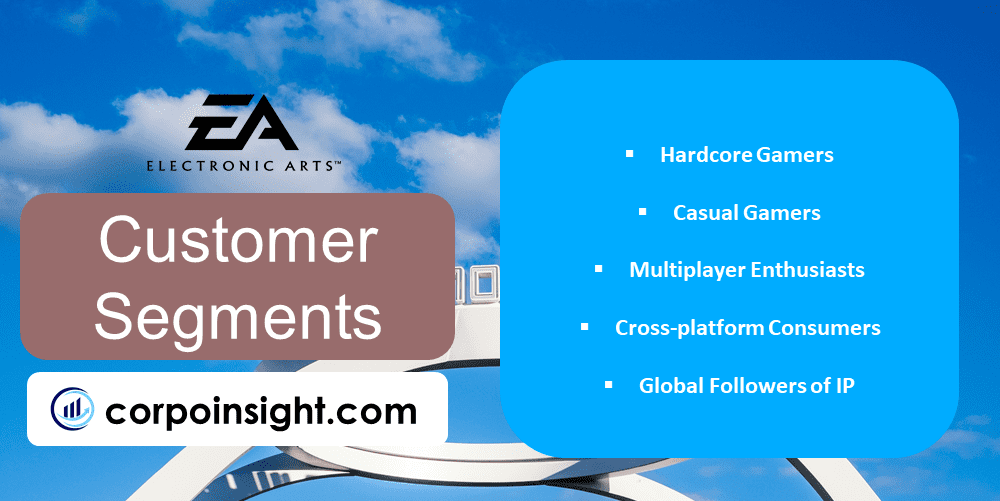
Hardcore Gamers: EA targets dedicated console and PC gamers seeking immersive gameplay with franchises like Battlefield, Apex Legends, and FIFA. For example, Battlefield 2042 sold over 4.23 million units in its first week, indicating a strong enthusiast fanbase.
Casual Gamers: With mobile titles like The Sims FreePlay (over 140 million downloads) and Apex Legends Mobile, EA reaches more casual audiences seeking entertainment on the go. The success shows the mass appeal of EA’s IP beyond hardcore fans.
Multiplayer Enthusiasts: Games emphasizing online multiplayer experiences, like FIFA and Madden NFL, cater to sports gaming fans who relish competing with others. Madden NFL 22 drew over 330 million hours played at launch, underlining multiplayer retention.
Cross-platform Consumers: By delivering content across consoles, PC and mobile, EA manages to attract users that play across platforms depending on lifestyle needs and access preferences in a seamless entertainment ecosystem.
Global Followers of IP: Thanks to universally popular IPs like Star Wars, EA commands a worldwide following across demographics looking to interact with beloved franchises, as evidenced by over $3.9 billion in net bookings from live services for global fans in FY2023.
Value Proposition – Electronic Arts Business Model Canvas
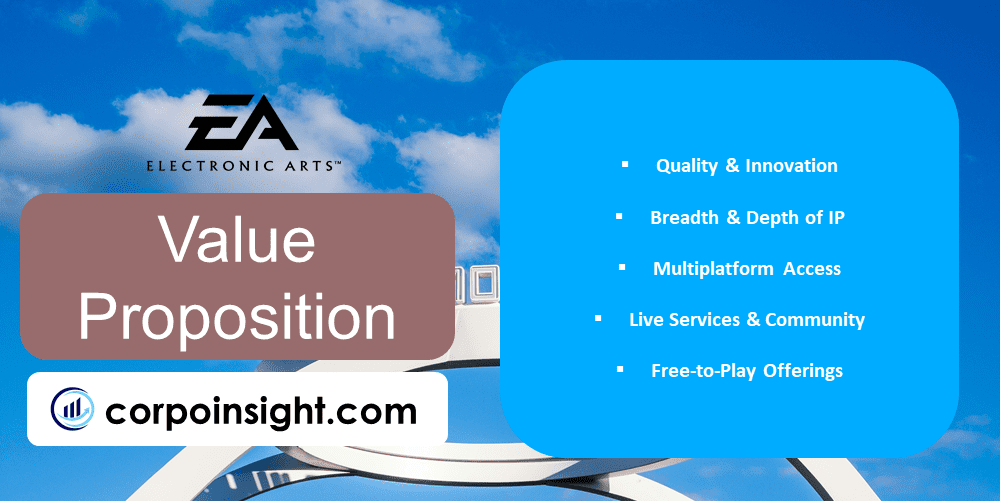
Quality & Innovation: EA invests heavily in state-of-the-art development, game engines like Frostbite, and new titles to push boundaries, exemplified by pioneering EA Sports games featuring new gameplay physics, modes, and integrated leagues/events.
Breadth & Depth of IP: By owning one of the industry’s richest IP catalogs spanning major sports leagues, Star Wars, Battlefield, and more, EA provides unmatched entertainment depth, including over 425 million user accounts and current players across franchises.
Multiplatform Access: Unlike platform-centric rivals, EA makes its franchises broadly accessible across console, PC, and mobile platforms, meeting players wherever they are, as demonstrated by Apex Legends thriving with over 30 million monthly active users across devices.
Live Services & Community: EA maintains long-term engagement via online services, updates, leagues, tournaments, and communication tools that foster social connections. For instance, over 250 million players have joined EA Sports’ global competitive gaming network.
Free-to-Play Offerings: Complimenting premium games, EA offers free access to popular mobile titles, driving mass adoption, as exemplified by 170 million downloads for free-to-play Apex Legends Mobile in just one year since its launch.
Revenue Streams – Electronic Arts Business Model Canvas
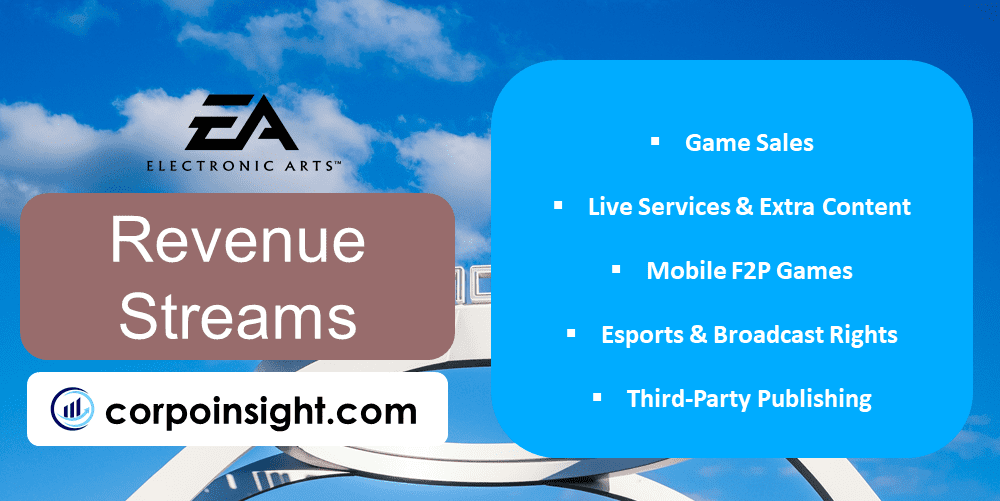
Game Sales: Sales of full premium games across platforms like FIFA 23 and Madden NFL generate significant upfront revenue, totaling $4.15 billion in packaged goods and digital full-game sales in Fiscal 2023.
Live Services & Extra Content: Providing ongoing value, additional player content, in-game purchases, and subscriptions deliver recurring revenues, comprising $2.11 billion in live services net bookings in FY2023 to keep players engaged.
Mobile F2P Games: Monetization of free games on mobile like Apex Legends Mobile and Star Wars: Hunters through in-app purchases and advertising supplement sales, generating over $810 million in FY2023 mobile net revenue.
Esports & Broadcast Rights: Tapping into surging audience interest in gaming competitions, broadcast rights, and sponsorships associated with EA competitive events like Apex Legends Global Series introduce new monetization while expanding brand reach.
Third-Party Publishing: By leveraging its expertise to publish third-party titles, EA diversifies its portfolio beyond owned IP, providing additional revenue streams, recently evident via the Knockout City game publishing deal with Velan Studios.
Channels – Electronic Arts Business Model Canvas
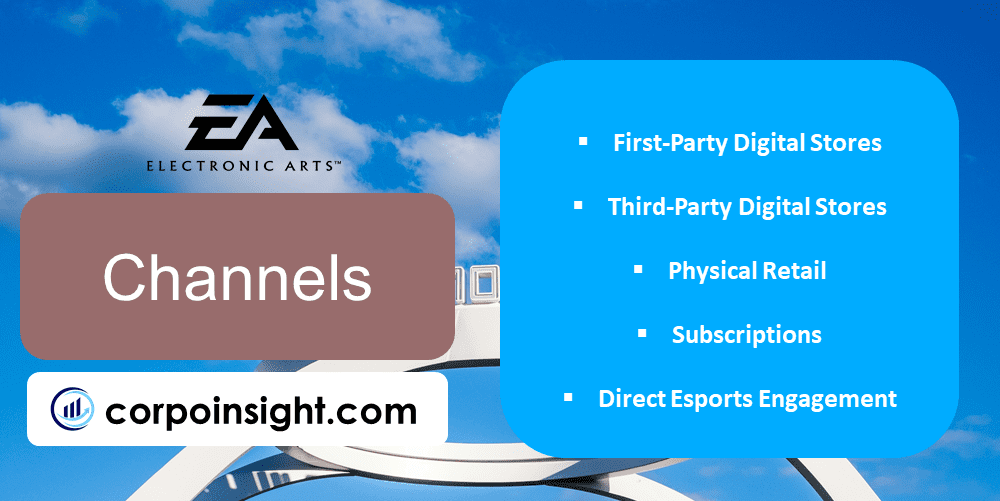
First-Party Digital Stores: EA distributes titles and live services directly to consumers via their Origin online platform and EA app for Windows PC users as well as their Eden Games Store for Apple platform users, meeting 170 million PC monthly active accounts.
Third-Party Digital Stores: To access expansive console and mobile audiences, EA collaborates with platform holder stores like Sony’s PlayStation and Microsoft’s Xbox stores along with major mobile app stores, amounting to $5.6 billion in net revenue from third-party stores.
Physical Retail: Despite the digital shift, physical discs remain relevant for some. Hence, EA offers games via merchant partners globally, though physical sales declined to just $350 million in FY2023.
Subscriptions: Looking ahead, EA offers subscription access to titles via third-party membership programs like Xbox Game Pass and PlayStation Plus to tap into this high-growth model, aligning with evolving user preferences.
Direct Esports Engagement: With competitive gaming viewership expanding, EA’s direct operation of esports events for Apex Legends, FIFA, Madden NFL, and more enables deeper audience relationships beyond conventional channels.
Customer Relationships – Electronic Arts Business Model Canvas
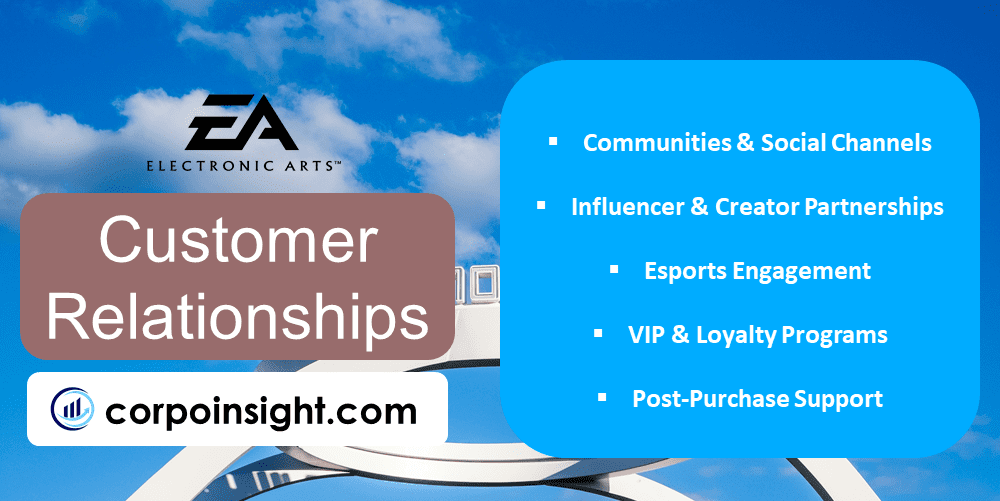
Communities & Social Channels: EA builds close connections with gamers through official forum communities, Reddit, Discord servers, and social media accounts for specific titles that foster sharing, feedback, and discussions among over 425 million player accounts.
Influencer & Creator Partnerships: Collaborating with gaming personalities, commentators, live streamers, and content creators expands awareness and game exposure, as demonstrated by EA’s Support-A-Creator program promoting streamers.
Esports Engagement: Direct operation of global tournaments and leagues for FIFA, Madden NFL, Apex Legends, and more allows deeper relationships with competitive gaming fans via exclusive live event access and viewership.
VIP & Loyalty Programs: EA provides incentives for long-term retention and continued spending through loyalty programs like EA Play and EA Sports Season Ticket, granting early access, content, and member-exclusive benefits across portfolios.
Post-Purchase Support: Multiple support channels, including email, chat, self-help online resources, official help forums, and social media teams, service inquiries regarding purchases, account issues, or in-game needs.
Key Activities – Electronic Arts Business Model Canvas
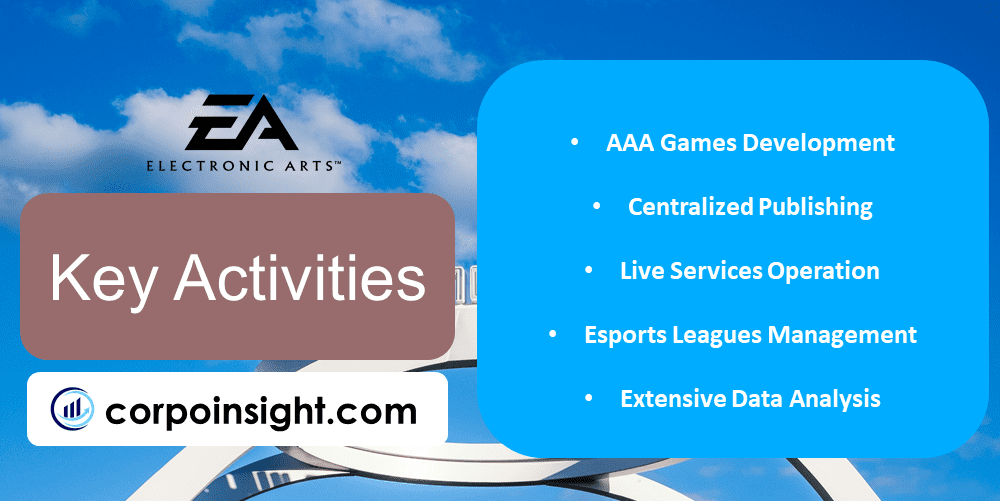
AAA Games Development: EA develops high-budget, premium-quality titles across sports, action, adventure, and casual genres spanning top franchises like FIFA, Madden, Battlefield, and The Sims with industry-advancing graphics and game engine technology supported by thousands of developers.
Centralized Publishing: By publishing all titles under the EA umbrella regardless of the development studio, EA maintains quality control and uniform brand presence and coordinates sales, distribution, and marketing at scale across platforms, reaching hundreds of millions.
Live Services Operation: EA maintains long-term player engagement and recurring revenue via live services, including content updates, tournaments, leagues, and web/mobile community apps surrounding hit games, generating $2.11 billion in annual live services revenue.
Esports Leagues Management: Through competitions like APEX Legends Global Series, Madden NFL Championship Series, and FIFA Global Series, EA manages tournaments, organizes events, produces broadcasts, and distributes prize money to nurture professional scenes.
Extensive Data Analysis: Applying data science across user telemetry, engagement metrics, sales dynamics modeling, and market research, EA informs decisions on IP utilization, features adjustment, and commercial optimization.
Key Resources – Electronic Arts Business Model Canvas

Top Development Talent: With 9,000+ developers, EA commands industry-leading creative and technical talent across its network of owned studios like DICE, BioWare, Respawn, and Criterion that develop and support hit gaming IP to maintain pace with player expectations.
Global Infrastructure: EA invests heavily in cloud infrastructure, development tools, analytics engines, and digital commerce platforms to manage live services at a massive scale and deliver seamless cross-platform access to hundreds of millions while also nurturing security, availability, and data privacy.
Extensive IP Catalog: EA’s broadly appealing, fan-favorite entertainment IP across sports leagues, Star Wars, The Sims, Battlefield, and more compels audiences to engage while also enabling creative expansion into new titles consistently.
Strategic Publisher Relations: Close ties with major platform partners, including Sony, Microsoft, Google, and Apple, via fair revenue share arrangements, collaborative marketing, and access to subscription services secures distribution to target audiences wherever they play games.
Financial Strength: With annual cash flow from operations exceeding $1.5 billion in FY2023 and total assets near $18 billion, EA possesses ample capital to finance emerging growth initiatives, acquisitions, and studio investments.
Key Partners – Electronic Arts Business Model Canvas

IP Owners: By licensing prestigious intellectual property like FIFA, UEFA, NFL, NFLPA, FIFA, UFC, and Star Wars, EA integrates authenticity and globally renowned franchises into games spanning numerous bestselling series and live services.
Cloud Infrastructure: Scalable cloud platforms from Microsoft Azure, Amazon Web Services, and Google Cloud enable EA to provide online services to growing player bases of popular titles while readily analyzing usage data.
Esports Partners: Partnerships with organizers like FIFA and tournament operators like FACEIT fund competitions, coordinate broadcasting, and broaden promotional avenues for EA’s esports portfolio from Apex Legends to Madden NFL.
Retailers & Platforms: Distribution relationships with leading console makers, mobile app stores, and game retailers provide access to billions of platform customers to maximize the reach of EA releases like FIFA, Madden, Battlefield, and more.
Sponsors & Advertisers: Complementing game revenue sponsorship alliances across esports, in-game ads, and community events diversifies commercial growth levers via mutually beneficial copromotion with brands like Verizon and Discord.
Cost Structure – Electronic Arts Business Model Canvas
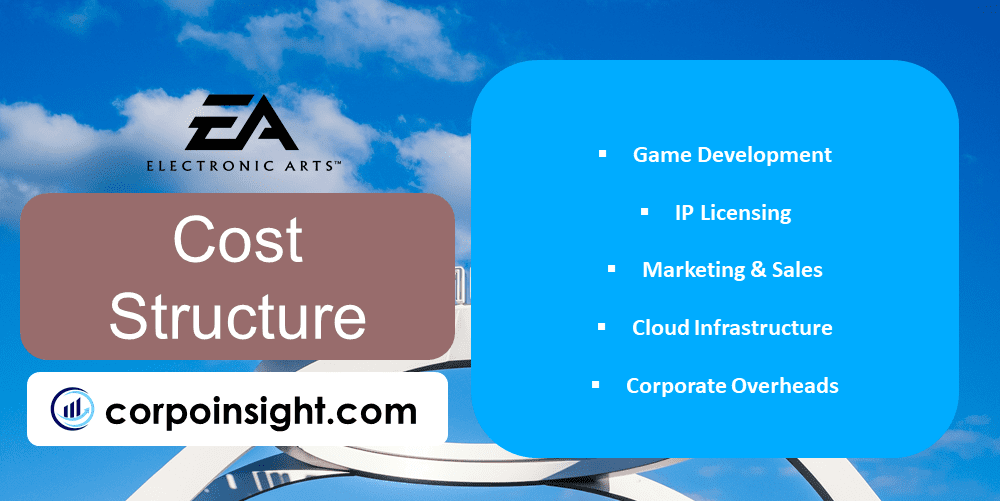
Game Development: With thousands of developers across studios to support AAA quality releases, talent and technology costs remain high, which is evident in EA’s $2.2 billion in total research and development expenses annually.
IP Licensing: EA’s partnerships with prestigious brands like FIFA and NFL contribute significant yet crucial licensing fees, amounting to almost $1.25 billion in royalty costs paid out to IP owners in fiscal 2023.
Marketing & Sales: Building awareness for major releases calls for material investments in advertising, promotional events, brand collaborations, and more, comprising over $830 million in total sales & marketing annually.
Cloud Infrastructure: Delivering online services at scale to serve hundreds of millions of gamers monthly demands ongoing cloud capacity upgrades, technical operations, and security measures totaling around $375 million in IT costs per annum.
Corporate Overheads: Across general administration, legal, finance, and executive functions over 30 global offices, critical business infrastructure contributes to general overhead expenses, recently totaling over $800 million.
Summary of Electronic Arts Business Model Canvas
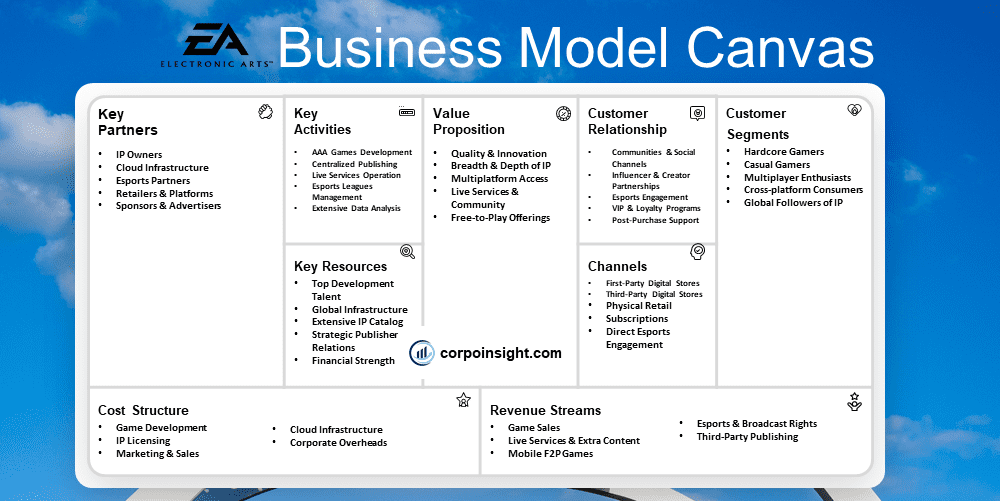
Conclusion on Electronic Arts Business Model Canvas
Electronic Arts has built an industry-leading position as a top interactive entertainment publisher by investing in iconic IP, top talent, technical capabilities, and strategic partnerships to deliver highly engaging gaming experiences across platforms. Underpinned by a player-centric ecosystem tying together development, publishing, competition, and community, EA manages to nurture lasting player relationships across titles, as evidenced by strong live service revenues. Although not without past criticism, EA continues working to push boundaries and broaden access to quality interactive entertainment.

This is Ahsanul Haque, someone very passionate about digital marketing, SEO, and Data Analytics and founder of the Analytics Empire and currently pursuing my major in marketing at Bangladesh University of Professionals.







